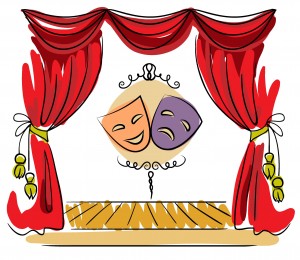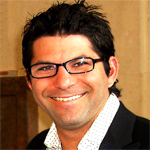7/3/14
In this two-part blog post, you will learn more about an amazing program at CRE Outreach, which uses theater to engage and improve confidence among the blind participants, which is how the program started, later helping at-risk youth and military veterans. In the second post on Tuesday, one of the blind actors, Caitlin, will share her experiences as a member of the CRE Outreach troop and what it has meant to her.

When twelve visually impaired kids, ranging in age from eight to thirteen, are busy creating characters for their original play, silence is a rarity. Here, in the safe space of an acting class where everyone is visually impaired. I glance around the circle to see whose turn it is to suggest a character … and then I understand the silence. Eric is ten years old, totally blind, and autistic. He’s almost completely nonverbal. If he has ideas, which I often sense that he does, we never hear them.
It’s highly unlikely that Eric’s going to speak, or share, or rise from his hunched, self-protective crouch among the other students. I prompt him anyway. “Eric, it’s your turn. Do you have an idea for a character?”
Without warning, he lights up. A burst of energy seems to lift him right out of his hunched position, and with more clarity and volume than I’ve ever heard from him before, he declares, “I want to be a human telephone!”
Eric went on to be the lead in our show and now interacts socially with other kids. Acting has helped him build up his confidence and find his voice. And he isn’t alone.
CRE Outreach aims to transform lives one show at a time. From inception to performance, these actors play a major role in all aspects of the production. Inclusivity is the cornerstone of CRE Outreach. Our productions are based on authentic stories and rarely-heard messages, conveyed by the very people who should be sharing them.
CRE Outreach works with three different populations–at-risk youth, military veterans, and the visually impaired–using theater as an empowerment tool. For all participants, stepping into another character allows them to forget about themselves for a while. They feel new emotions, take on new experiences, and live a life which they don’t have the opportunity to live every day.
For blind actors, visual impairment is their common thread, but it’s their will to define their disability which truly binds them. To cement that bond, we introduce each new blind actor to our theater group with an exercise called “The Run.” One by one, each visually impaired actor races from one side of the stage to the other: an experience that they have never had before. Learning to use sound cues, along with textured mats on the floor, the actors break through their fears of movement and learn to navigate the stage independently. They learn to trust themselves and each other. As they run, they realize that the unknown isn’t half as scary as you’d think, when you have a family all around you.
 Greg Shane
Greg Shane
CRE Outreach
Co-Founder

